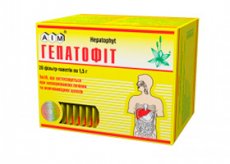Medical expert of the article
New publications
Preparations
Hepatophyte
Last reviewed: 04.07.2025

All iLive content is medically reviewed or fact checked to ensure as much factual accuracy as possible.
We have strict sourcing guidelines and only link to reputable media sites, academic research institutions and, whenever possible, medically peer reviewed studies. Note that the numbers in parentheses ([1], [2], etc.) are clickable links to these studies.
If you feel that any of our content is inaccurate, out-of-date, or otherwise questionable, please select it and press Ctrl + Enter.

Hepatophyte is prescribed for the treatment of diseases affecting the gallbladder and liver.
The drug helps restore liver cells (hepatocytes), improves the liver's antitoxic activity and potentiates bile secretion processes. At the same time, it weakens the tone of the bile duct with the gall bladder, increases bile acid levels, and also lowers cholesterol levels. In addition, the drug moderately helps lower blood glucose levels.
Indications Hepatophyta
It is used for combined treatment of pathologies developing in the area of the biliary tract and liver ( cholecystitis and chronic hepatitis, dyskinesia affecting the biliary tract (has a hypotonic type), as well as cholangitis). In addition, it can be prescribed in combined treatment for diabetes mellitus.
Release form
The medicinal product is released in the form of a herbal collection, inside 50 g sachets. There is 1 sachet in a box.
 [ 5 ]
[ 5 ]
Dosing and administration
You need to take 2 tablespoons of the herbal mixture and pour 0.5 liters of boiling water over them. Then this mixture is infused in a lidded container for 60 minutes, and then filtered.
Children over 7 years of age and adults consume the tincture warm, in a volume of 0.15 l (⅔ glass), before meals (20-30 minutes), 3 times a day.
The duration of taking the collection is determined by the attending physician. Often the therapeutic cycle lasts a maximum of 1 month. If necessary, the course can be repeated with the doctor's prescription.
Use Hepatophyta during pregnancy
There is no information regarding the medicinal efficacy and safety when taken during lactation or pregnancy. For this reason, the drug is not prescribed during these periods.
Contraindications
Main contraindications:
- elevated blood pressure (grade 3);
- jaundice of an obstructive nature;
- Gallstone disease with stones whose diameter is over 10 mm;
- decreased blood glucose levels;
- hepatitis of viral origin in the active phase;
- thrombophlebitis;
- increased blood clotting;
- acute intoxications of various origins;
- severe intolerance associated with elements of the drug or other plants from the Asteraceae group (such as Compositae/Asteraceae).
Side effects Hepatophyta
The medication is generally tolerated by patients without any complications. But given its composition, which contains many elements, or in case of violation of the doctor's prescribed regimen, the following side effects can be expected:
- disorders associated with digestive function: vomiting, mild diarrhea, heartburn, nausea and dyspepsia;
- respiratory problems: dyspnea;
- urinary tract lesions: potentiation of diuresis;
- epidermal disorders: signs of allergy, including hyperemia, itching and skin swelling;
- other: potentiation of existing vestibular disorders.
If any negative symptoms develop, you should consult a medical professional.
Overdose
Intoxication with Hepatophyte may provoke a potentiation of side effects.
Storage conditions
Hepatophyte must be stored in a place closed to small children. Temperature values are maximum 25°C.
Shelf life
Hepatofit can be used for a 2-year period from the date of manufacture of the medicinal product.
 [ 14 ]
[ 14 ]
Application for children
Hepatofit should not be used in children under 7 years of age.
 [ 15 ]
[ 15 ]
Analogues
Analogues of the drug are Allochol, Choleretic collection, Holosas and Artichol with Piflamin, and in addition Artichoke, Tansy flowers, Bilikur with Salvat and Holenzym with Hepabel. In addition, the list includes Gepar-pos, Pm sirin, Holagol and Gepafitol, Febichol with Cynarix, Hepatsinar, Holagogum, Coriander fruits and Flamin. Also among the drugs are Raphacholine, Cinacholine, Fitogepatol, Holiver with Himecromon and Hofitol.
Reviews
Hepatofit receives quite good reviews from patients. Its advantages include the safety of its natural (plant) composition, high efficiency (it has a good effect on the liver, reduces cholesterol levels) and an affordable price.
Among the disadvantages, some patients point out the rather unpleasant smell and taste of the herbal mixture.
 [ 19 ]
[ 19 ]
Attention!
To simplify the perception of information, this instruction for use of the drug "Hepatophyte" translated and presented in a special form on the basis of the official instructions for medical use of the drug. Before use read the annotation that came directly to medicines.
Description provided for informational purposes and is not a guide to self-healing. The need for this drug, the purpose of the treatment regimen, methods and dose of the drug is determined solely by the attending physician. Self-medication is dangerous for your health.

